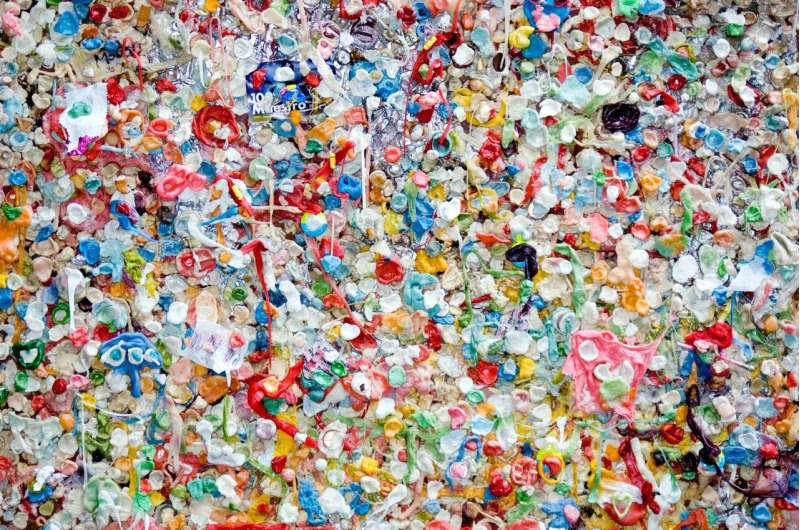Study supports a return to Indigenous-led solutions to reverse plastics pollution

The dumping of plastics in the Pacific Islands (Te Moananui) is a form of waste colonization, leading to disproportionate plastics pollution in the region and threatening the health and livelihoods of its people.
In a paper published today in the Journal of Political Ecology, researchers demonstrate that prioritizing the perspectives of Indigenous caretakers, rather than the concerns of settler-colonizers and commercial companies with vested interests, is crucial to reversing plastic pollution and ending the exploitation of Te Moananui as a dumping ground.
Co-author Dr. Sascha Fuller, environmental anthropologist and Pacific Engagement Coordinator at the University of Newcastle, said that despite their known harms, the rate of toxic plastics production and consumption is accelerating worldwide.
"The global pandemic has had a significant impact on our demand for single-use plastics, which are ironically marketed as healthy and sanitary," Dr. Fuller said.
"But many single use plastics are problematic because of their toxic nature and this makes them incredibly unhealthy, both for our environment and for humans."
The joint research reveals that plastic pollution is waste colonization in Te Moananui. Te Moananui is grossly and disproportionally affected by plastics pollution due to its physical location and inherent colonialism which has impacted Te Moananui peoples' spiritual, social, cultural, economic, and social ties with their ocean.
"Despite being on the frontline of the world's plastics problem Te Moananui haven't had a seat at the table when it comes to the solution. This must change if we are going to curb the global plastic disaster," Dr. Fuller said. "Pacific peoples have the solution, and they have the science, they have managed and protected their ocean for thousands of years.
A new global treaty to stop plastics pollution
A United Nations (UN) Treaty to end plastic pollution will be in place by 2024 and will include a ''lifecycle approach" to plastic pollution, which may see plastic manufacturers and producers held more accountable.
Dr. Fuller hopes that findings from the newly released study will inform the treaty's rollout.
"The issue of plastics pollution cannot be solved by waste management," she explained. "It can only be solved by preventative measures including restricting the production and circulation of harmful plastics."
"This would include the regulation of virgin plastic production, and the introduction of design and manufacturing standards that ensure every plastic product is safe and recyclable. The introduction of warning labels on toxic plastic products, similar to the warning labels compulsory on cigarette packs, should be part of the treaty rollout," Dr. Fuller said.
The importance of Indigenous-led solutions
Indigenous voices are centered at the heart of the research with sixteen Indigenous leaders in the field of plastics pollution prevention consulted, and Indigenous science and epistemologies incorporated into the research.
Dr. Fuller said the key to the plastics pollution crisis lies in recognizing the importance of Indigenous-led solutions and Indigenous leadership.
"If we're going to meaningfully address pollution then Indigenous traditional knowledges must be part of the solution."
There are readily available local alternatives in Te Moananui and elsewhere. For example, single-use plastic bags are being replaced with bilums in Papua New Guinea and Vanuatu, and banana and coconut fronds used for weaving baskets and for packaging take-home foodstuffs in Samoa. The use of alternatives has a strong track record. In 2019, Samoa held a plastic-free Pacific Games, while the Te Moananui region has managed to endure the global pandemic, despite the lack of tourism economy, "in part due to their reliance on customary knowledge, systems, and practices."
Waste colonialism and the Pacific Garbage Patch
Dr. Fuller said the fact that Te Moananui contribute as little as 1.3% of the world's plastics pollution, yet bears brunt of the world's plastics pollution problem is an environmental injustice. Her research frames this through the lens of waste colonialism.
"Moananui nations are currently ill-equipped to manage the costly and harmful impacts of this global problem, which is huge in magnitude and externally generated," Dr. Fuller said. While countries in the Pacific region need to strengthen their legislation around plastics, that is not the main issue here. The issue of critical importance is what is the rest of the world is doing—or not doing."
"Plastic waste is coming into the region through trade, tourism, the fishing industry and marine litter which flows in on ocean currents and from shipping lanes and collects in the Pacific Ocean. It ends up on the coastlines and Land of Pacific Nations, impacting the environment, human health and livelihoods."
Since the Pacific Islands are increasingly import-dependent for goods and services including food and beverages, and without legislation in place that enforces safe design and extended producer responsibility (EPR) standards, Dr. Fuller said toxic plastics will continue to pollute the Pacific.
Local efforts are thwarted by large companies with economic interests in the area. For example, in 2021 Coca-Cola stopped distributing glass bottles in Samoa in favor of plastic ones through a local distributor, putting pressure on the central and local government, and communities to manage yet more plastic waste.
Coupled with barriers to accessing the latest science, along with Moananui voices being drowned out by larger economic powers in international forums, the problem of waste colonialism in the Pacific remains.
Dr. Fuller said the need for a collective voice, prioritizing Indigenous knowledge and policy, is clear.
The research paper "Plastics Pollution as Waste Colonialism in Te Moananui" was published by the Journal of Political Ecology and is a joint study by Dr. Sacha Fuller, University of Newcastle, Australia; Tina Ngata, Indigenous Rights Advocate and Independent Researcher from Ngati Porou; Dr. Stephanie Borrelle, BirdLife International, Fiji; and Dr. Trisia Farrelly, Massey University, NZ.
More information: Sascha Fuller et al, Plastics pollution as waste colonialism in Te Moananui, Journal of Political Ecology (2022). DOI: 10.2458/jpe.2401
Provided by Newcastle University





















